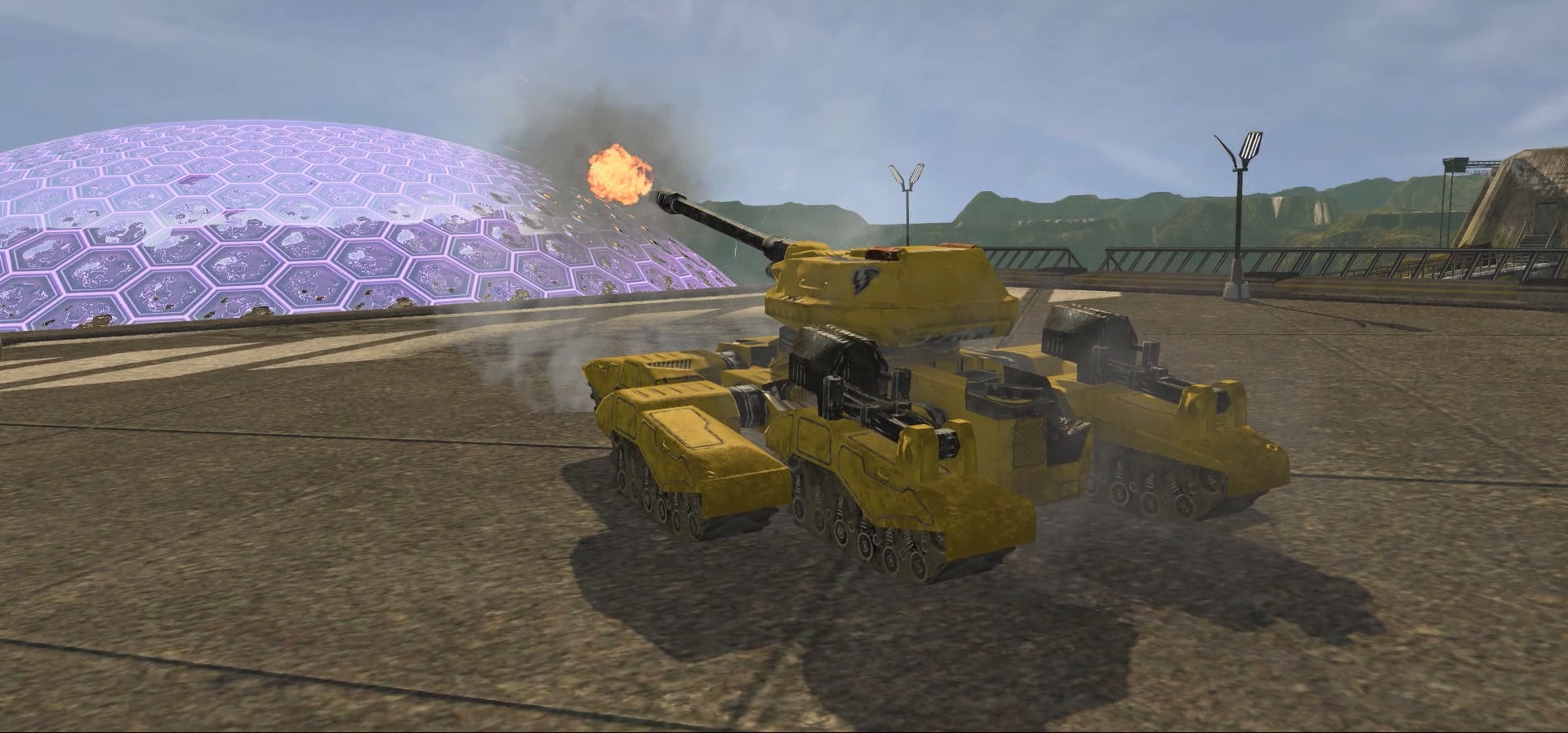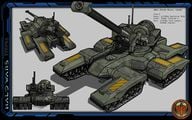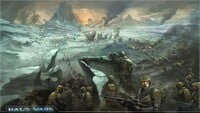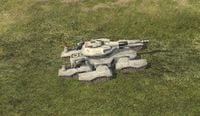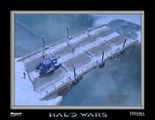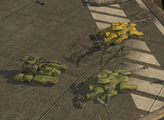M145D Rhino
From Halopedia, the Halo wiki
| M145D Mobile Artillery Assault Platform | |
|---|---|
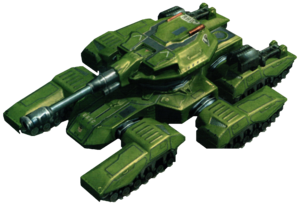
| |
| Production information | |
|
Manufacturer: |
|
| Technical specifications | |
|
Length: |
|
|
Width: |
|
|
Height: |
3.8 meters (12.4 ft)[2] |
|
Mass: |
76.6 metric tons (75.4 LT; 84.4 ST)[2] |
|
Hull: |
|
|
Armament: |
|
|
Crew: |
One operator[1] |
| Usage | |
|
Role(s): |
Plasma artillery platform |
|
Affiliation: |
|
The M145D Mobile Artillery Assault Platform (MAAP), commonly known as the Rhino, is an artillery tank used by the United Nations Space Command. It is unique among UNSC vehicles in its armament, a plasma cannon that was reverse-engineered from Covenant technology.[1][3]
Overview[edit]
Design details[edit]
The architecture of the M145D is similar to that of the M808B and M850—even sharing technology with the Scorpion[3]—though it is longer and wider than the former vehicles. This larger chassis is designed to support the vehicle's six-bogey tread configuration, which in turn facilitates a lockdown mode—akin to that of the SP42 Cobra and M400 Kodiak—when the cannon is fired.[1] The tank's middle tread bogeys extend farther outward than the forward bogeys. The rear bogeys lie between the middle ones and jut from the back of the tank's chassis; stabilizer mechanisms are mounted to the rear tracks.[1] The Zeus cannon is mounted to a large turret, akin to that of the Grizzly; the weapon is capable of traversing upward at a roughly forty-five-degree angle. As with all plasma-based weapons, the Zeus is potent against energy shielding.[4][5]
The Rhino has Titanium armor capable of shrugging off all but the heaviest attacks.[3]
Armament[edit]
The M145D Rhino's most unique trait is its armament—a custom-built howitzer nicknamed the "Zeus"—or the XM4600 plasma munition howitzer. The Zeus is a massive 320mm cannon capable of taking specially-modified shells, designed using alien materiel recovered during the Harvest campaign. While termed a plasma weapon and emitting a firing effect similar to those of a plasma mortar,[Note 1] the Zeus cannon fires specially-modified 320mm artillery shells using recovered heavy fuel rods as filler. As a result, the weapon is extremely effective when used—especially against energy shielding.[2]
Additionally, the Zeus cannon has a range of up to 100 km.[3]
Development history[edit]
During the Harvest campaign, the Office of Naval Intelligence procured large amounts of Covenant matériel in the hope of reverse-engineering it. These efforts yielded varied results, one of the most substantial being the XM4600 Zeus plasma munition howitzer—a unique weapon in the UNSC arsenal, and one of the first directed-energy weapons to enter UNSC service.[1] Chalybs Defense Solutions, the creators of the M808 Scorpion and M850 Grizzly main battle tanks, were contracted to manufacture the M145D Rhino as a platform for the weapon.[1][2][Note 2]
By February of 2531, the UNSC was field-testing the Rhinos. Several prototypes were kept on the UNSC Pillar of Autumn, apparently for this purpose.[4]
Operational history[edit]
Human-Covenant war[edit]
The Rhino had entered service by February 2531 at the latest. On February 9, 2531, they participated in the invasion of Arcadia. Prior to their arrival, the Covenant established a large base at a complex of Forerunner ruins near an ONI base, over which they deployed an enormous energy shield dome. The crew of the UNSC Spirit of Fire, the only remaining combat-ready UNSC forces in the system, requested several Rhinos from the UNSC Pillar of Autumn, which had been damaged in the initial stages of the attack. During a costly battle, Spirit of Fire's Marine complement, aided by a firebase built nearby, worked to escort the Rhinos into position. Professor Ellen Anders was able to determine that they needed five of them after an attempt to use three in conjunction with one another caused part of the dome to flicker but not fail. Finally, when five Rhinos were used simultaneously on the dome, they overloaded the shield's power supply and caused a section of it to disappear, allowing the Spirit of Fire to safely use its MAC guns to take out the shield generators and Covenant air defenses, destroying the dome.[4]
Some of these Rhinos were then deployed to the ruins, where the Marines encountered a Scarab excavation platform that was still under construction. The remaining Rhinos then assisted in the destruction of the Scarab.[5]
Post-war[edit]
Some Rhinos still exist as of 2558, though they have been used sporadically due to insufficient resources and a lack of refinements to the prototype. However, the data gleaned from the Rhino's development and use was later used on other projects. The M145D Rhino initiative has seen renewed interest in development due to the interest of Isaac Richardson, one of the UNSC's top procurement officers.[1][6]
Gameplay[edit]
Although the Rhino's firepower is weaker than that of the Scorpion, it has superior armor. A group of these tanks is powerful enough to destroy heavy armor, but the vehicle is intended to play a fire support role alongside a large UNSC force. Its secondary ability deploys it into a 'lockdown' mode like that of the Cobra and the Elephant, giving the Rhino a more powerful attack with increased range.
The Rhino is exclusive to two campaign missions in Halo Wars: Dome of Light and Scarab. Besides its importance to the plot, the Rhino functions almost identically to the Cobra in terms of speed and firepower. The sound effect of its deployed artillery cannon is shared with the Cobra. Preventing all the Rhinos from being destroyed in the level grants the player the Rhino Hugger achievement.
Unlike the other vehicles in the game, a Rhino cannot be constructed through the vehicle depot and instead can only be gotten by the player through using the Arcadia ONI facility's landing pad to request one from the UNSC Pillar of Autumn which then sends a Pelican to drop one off. This means that more cannot be summoned during Scarab as the pad is no longer available. In that level, the player only has access to the Rhinos that they started off with.
Trivia[edit]

|
Browse more images in this article's gallery page. |
- As with most UNSC vehicles, the Rhino is named after an animal.
- A lightning bolt is painted on the side of the Rhino's turret. This is likely a reference to Zeus, the chief deity of the Greek pantheon, who is the namesake of the Rhino's cannon. Zeus used lightning bolts as weapons and as symbols of his power.
Gallery[edit]
Rhinos and an M808B Scorpion on Arcadia.
List of appearances[edit]
- Halo Wars (First appearance)
Notes[edit]
- ^ The Rhino's plasma mortar effect in-game within Halo Wars is likely a gameplay-only aesthetic consideration.
- ^ The "D" in the Rhino's designation suggests that it is the fifth version of the M145. In the opening cutscene of the level Dome of Light, Professor Anders refers to the vehicles as "plasma-based Rhinos". The most straightforward explanation is that is she noting the experimental tanks' armament, suggesting their use in eliminating the shield dome. However, it is also possible that she is differentiating the M145D from previous Rhino models, from which one may infer that the M145D is based on an existing design rather than built specifically for the Zeus cannon. This is supported in the 2022 Halo Encyclopedia, which notes the Zeus cannon specifically as a custom-built weapon.
Sources[edit]
- ^ a b c d e f g h i j k Halo: The Essential Visual Guide, page 155
- ^ a b c d e f g Halo Encyclopedia (2022 edition), page 141
- ^ a b c d e f Halo Wars: Official Strategy Guide, page 28
- ^ a b c Halo Wars, campaign level Dome of Light
- ^ a b Halo Wars, campaign level Scarab
- ^ Halo Waypoint, Canon Fodder - Clarity & Grace (Retrieved on Dec 29, 2019) [archive]
| ||||||||||||||||||||||||||
